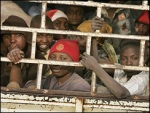
A Peacemaking Curriculum
Kenya has traditionally been one of the most stable and democratic African countries, but following the presidential election of December 27, 2007 unrest broke into violence.
Here are some of the events of that time period:
Shortly after the polls closed, the incumbent president, Mwai Kibaki, claimed victory.
Raila Odinga, the opposition candidate, called for a recount.

Some people thought there was fraud and riots broke out.
Newspapers estimated that over 1,000 people were killed and 300,000 people were homeless as a result of the riots.
On February 27, 2008 a power-sharing agreement was reached.
Kibaki remained as President, Odinga became Prime Minister and peace was restored
During the violence many people were housed in Displaced Persons Camps.  Members of the Friends Peace Making Teams worked to bring reconciliation between these people and the people in the villages so people could return to their homes.
Members of the Friends Peace Making Teams worked to bring reconciliation between these people and the people in the villages so people could return to their homes.
Surveys were given to people in the Displaced Persons Camps to find out what would help prevent future violence. One suggestion was to teach peacemaking skills in the schools that would help young people learn peaceful ways to resolve conflicts.
Friends felt that they could be instrumental in providing this curriculum for several reasons. First, Friends are a Christian denomination which has traditionally taught values (called Testimonies) that support peace. Some of the Friends Testimonies are Justice, Simplicity, Integrity, Equality, Community, and Peacemaking. Second, Friends have many schools in Kenya. There are 210 Friends High Schools and more than 1200 Friends Primary Schools in Kenya. These schools teach over one million children. The government is supportive of Christian Education in the schools and is encouraging Peace Education.
The focus of this website is curriculum for Classes 2-8 (2nd-8th grades). Another group is writing the high school curriculum.
The vision for the curriculum grew as people from other countries got involved in writing the curriculum. Friends began to dream that people from many different countries might use this curriculum in Christian schools and Sunday Schools.
In Kenya there is not access to the Internet in many locations so the curriculum must be print based rather than web-based. $100,000 or more is needed to print this curriculum for all the Friends Primary Schools in Kenya and to train teachers to use it. Funding for this curriculum is handled through Friends United Meeting, Richmond, Indiana. Go to Donate to give for printing for Kenya Schools.